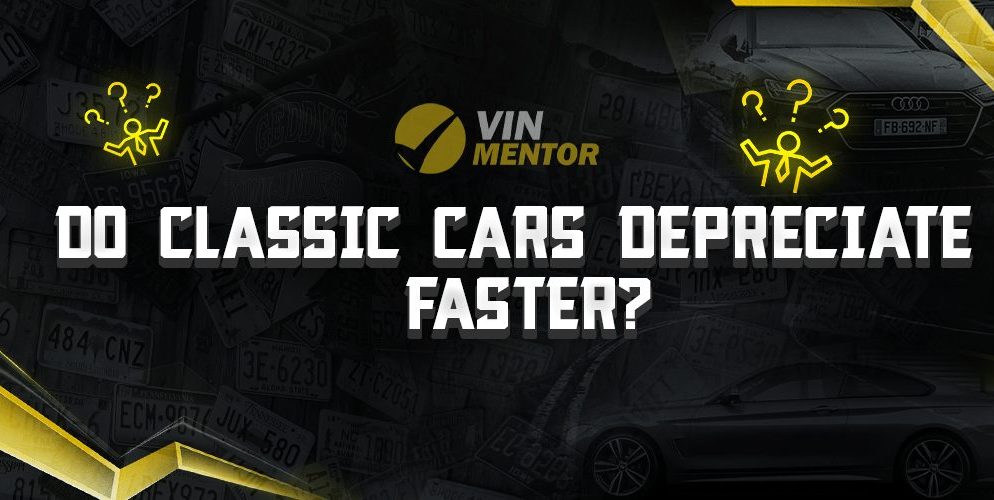

Exploring the Depreciation of Classic Cars Classic cars evoke a sense of nostalgia and passion among enthusiasts, but when it comes to their depreciation, there are several factors at play. In this article, we will delve into the world of classic car depreciation and examine the key factors that influence their value over time. By understanding these factors, enthusiasts and potential buyers can make more informed decisions about classic car investments.
Key Takeaways
- Classic cars that are rare or highly sought after by collectors tend to experience slower depreciation rates due to their exclusivity and high demand.
- Well-maintained classic cars depreciate at a slower pace, emphasizing the importance of regular maintenance, proper storage, and adherence to original specifications.
- Classic cars associated with famous individuals, significant events, or limited-edition models have a higher chance of retaining value or even appreciating over time.
- Fluctuations in the collector car market, changes in consumer preferences, and external factors like fuel prices and emission regulations can influence the depreciation of classic cars.
- Before investing in a classic car, it is crucial to perform a thorough VIN check to verify its history and condition.
Exploring the Factors Influencing Classic Car Depreciation
When it comes to classic cars, understanding the factors that influence their depreciation is essential for enthusiasts and potential buyers.
Rarity and Desirability
Classic cars that are rare or highly sought after by collectors tend to experience slower depreciation rates.
- Limited production numbers and exclusive features contribute to their desirability and value retention.
- Iconic models or those associated with significant historical events often appreciate or maintain their value over time due to their enduring popularity and cultural significance.
Condition and Maintenance
The condition of a classic car plays a crucial role in determining its depreciation rate.
- Well-maintained and properly preserved classic cars typically depreciate at a slower pace compared to those that have been neglected or poorly cared for.
- Regular maintenance, including routine servicing and repairs, as well as proper storage and protection from environmental elements, can help retain the car’s value.
- Adhering to the original specifications of the vehicle, such as using authentic parts and maintaining its authenticity, can also contribute to its overall worth.
Historical Significance
Classic cars with historical significance often have a higher chance of retaining their value or even appreciating.
- Cars associated with famous individuals, significant moments in history, or limited-edition models tend to attract collectors and enthusiasts who are willing to pay a premium for these unique vehicles.
- The historical context, provenance, and documentation of a classic car’s history, such as ownership records, restoration details, and original documentation, contribute to its desirability and value in the eyes of collectors.
Market Trends and Economic Factors
The collector car market and economic conditions can influence the depreciation of classic cars.
- Fluctuations in the overall economy, changes in consumer preferences, and shifts in collector tastes can impact the prices of classic cars. For example, during periods of economic downturn, demand for luxury or non-essential items may decrease, leading to a potential decline in classic car values.
- External factors such as fuel prices, emission regulations, and technological advancements can also influence the demand and value of classic cars. As environmental concerns grow and technology evolves, the desirability and market value of classic cars may be influenced by their efficiency, emissions, and compatibility with future regulations.
Conclusion
Classic cars can depreciate at varying rates depending on several factors. Rarity, desirability among collectors, condition and maintenance, historical significance, and market trends all influence the depreciation of classic cars. Rare and sought-after models tend to depreciate slower, while well-maintained cars also retain their value better. Classic cars associated with famous individuals or significant events have a higher chance of appreciating over time. Additionally, market trends and economic factors can impact depreciation, including changes in consumer preferences and external factors like fuel prices and emission regulations.
As with any vehicle purchase, conducting a thorough VIN check is recommended to verify the car’s history and condition. You can choose from our recommended best VIN Check Websites list to gain valuable insights before making a classic car investment. By considering these factors and conducting proper research, enthusiasts and potential buyers can navigate the world of classic car depreciation more effectively and make informed decisions.
FAQ
Do classic cars depreciate faster than modern cars?
Classic cars and modern cars have different depreciation patterns. Classic cars, especially those that are rare, well-maintained, or associated with historical significance, tend to depreciate at a slower pace compared to mass-produced modern cars. However, it’s important to note that the overall depreciation of classic cars can vary depending on several factors.
What factors contribute to the depreciation of classic cars?
Several factors influence the depreciation of classic cars, including rarity, desirability among collectors, condition and maintenance, historical significance, and market trends. These factors interact with each other and can impact the value of a classic car over time.
How does the rarity of a classic car affect its depreciation rate?
Classic cars that are rare or have limited production numbers often experience slower depreciation rates. The scarcity of these vehicles increases their desirability among collectors, leading to a higher demand and a potential increase in value over time.
Can proper maintenance slow down the depreciation of a classic car?
Yes, regular maintenance, including routine servicing, repairs, and proper storage, can help slow down the depreciation of a classic car. Well-maintained classic cars typically retain their value better than those that have been neglected or poorly cared for.
Are classic cars associated with famous individuals or significant events more likely to appreciate in value?
Yes, classic cars associated with famous individuals, significant historical events, or limited-edition models often have a higher chance of appreciating in value. The connection to renowned figures or important moments adds to their desirability and can attract collectors willing to pay a premium for these unique vehicles.
How do market trends and economic factors impact the depreciation of classic cars?
Fluctuations in the collector car market, changes in consumer preferences, and economic conditions can influence the depreciation of classic cars. Economic downturns may lead to a decrease in demand for luxury or non-essential items, potentially affecting the value of classic cars. External factors like fuel prices, emission regulations, and technological advancements can also impact the demand and value of classic cars over time.
Why is it important to perform a VIN check before investing in a classic car?
Conducting a thorough VIN check is crucial before investing in a classic car. It helps verify the car’s history, condition, and authenticity. A VIN check provides valuable insights into ownership records, restoration details, and original documentation, ensuring that you make an informed decision and avoid potential issues or fraud when purchasing a classic car.
Where can I find recommended VIN check websites?
You can find a list of recommended VIN check websites, offering valuable insights and reports on a classic car’s history and condition, to aid you in making an informed decision. These websites provide information about ownership records, accident history, mileage verification, and more.
Can classic cars ever appreciate in value?
Yes, certain classic cars can appreciate in value over time, especially those that are rare, well-preserved, or associated with significant historical events. However, appreciation is not guaranteed for all classic cars, and it’s important to conduct thorough research and consider various factors before expecting appreciation.
How can enthusiasts and potential buyers navigate the world of classic car depreciation effectively?
By considering factors such as rarity, condition, historical significance, market trends, and conducting proper research, enthusiasts and potential buyers can make more informed decisions regarding classic car depreciation. Thoroughly researching a classic car’s history, condition, and market trends can help navigate the complexities of the classic car market and make wiser investment choices.












